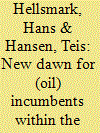|
|
|
Sort Order |
|
|
|
Items / Page
|
|
|
|
|
|
|
| Srl | Item |
| 1 |
ID:
175018


|
|
|
|
|
| Summary/Abstract |
This paper develops a more detailed understanding of when incumbent actors may become the main locomotive driving energy transitions. It also illustrates the trade-offs between policy approaches that actively seek to involve the incumbents in transitions, and policy approaches that pursue transitions without their active involvement. The paper examines state support for the bioeconomy in Sweden and concludes that public investments have been geared towards large-scale, complex and integrated biorefineries that are dependent on the active participation of the forest industry. Incumbents in the forest industry have, however, both lacked motivation and the abilities required to take the necessary steps for commercialisation of the demonstrated concepts. Instead, a rather small investment in a joint venture between actors from the forestry and oil refinery industry in Sweden has spurred learning and revenues; and it has placed an oil refinery at the centre of the future development of what we here term distributed biorefining. The main trade-off is that while this shift has opened up for cross-industrial collaborations and the production of advanced biofuels and materials, it has also paved the way for further investments in existing fossil-fuel infrastructure.
|
|
|
|
|
|
|
|
|
|
|
|
|
|
|
|
| 2 |
ID:
092841


|
|
|
|
|
| Publication |
2009.
|
| Summary/Abstract |
Gasified biomass is a technology that has the potential to partially replace fossil fuels for the production of heat, electricity, transport fuels, synthetic natural gas (BioSNG) and chemicals. In the context of climate change, biomass gasification is an attractive technology. It is, however, still in the early phase of its diffusion and much of the knowledge resides in the academic sector and in small companies-the technological innovation system (TIS) is in the process of being formed. Austria is one of the leading European countries in this field and much of the development in Austria can be traced to one prominent individual, Professor Hermann Hofbauer at the Technical University of Vienna. The purpose of this paper is to analyze how and the extent to which an individual academic, Professor Hofbauer, has influenced the formation of a TIS centred on gasified biomass in Austria. We find that his impact is multidimensional and significant but that there is also a frictional and intentional resistance that obstructs the commercialisation of the new technology. These sources of resistance go beyond the ability of an individual system builder to handle. Policy makers, therefore, need to add a strong element of system building activities that interact with and supplement those pursued by Professor Hofbauer.
|
|
|
|
|
|
|
|
|
|
|
|
|
|
|
|
| 3 |
ID:
111356


|
|
|
|
|
| Publication |
2012.
|
| Summary/Abstract |
There is a great interest in synthetic fuels produced from gasified biomass. These are expected to substitute for oil, complementing first generation biofuels. While the long-term substitution potential is uncertain, it may amount to a quarter of current fuel consumption in the EU. Various design approaches for gasifying biomass have been under development for decades but the current EU focus is on nine smaller scale demonstration plants, involving three technological trajectories. The purpose of this paper is to identify policy challenges and discuss options for moving to a larger scale diffusion of gasified biomass in the EU. Such a move requires that technical and market uncertainties are handled by policy. Substantial demonstration and other risk absorption schemes will have to be developed to shift technical risks to society at large. Market uncertainties need to be reduced by a regulatory framework that ensures that markets are formed. A range of instruments for forming markets is assessed. It is argued that in order for the policy to be effective, markets for all three trajectories should be created in parallel. This leads us to suggest either dedicated quotas or a feed-in-law. Yet, both these instruments have drawbacks and a 'bridging policy' is probably necessary.
|
|
|
|
|
|
|
|
|
|
|
|
|
|
|
|
|
|
|
|
|